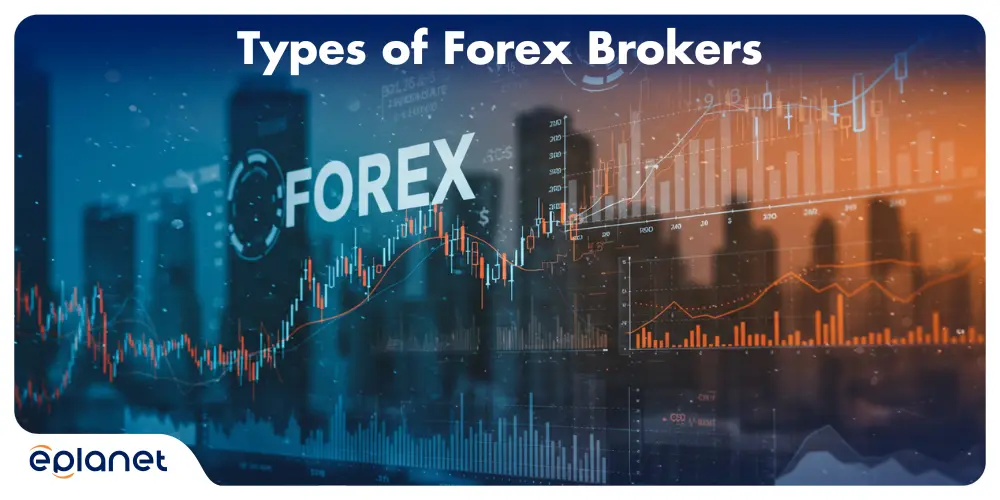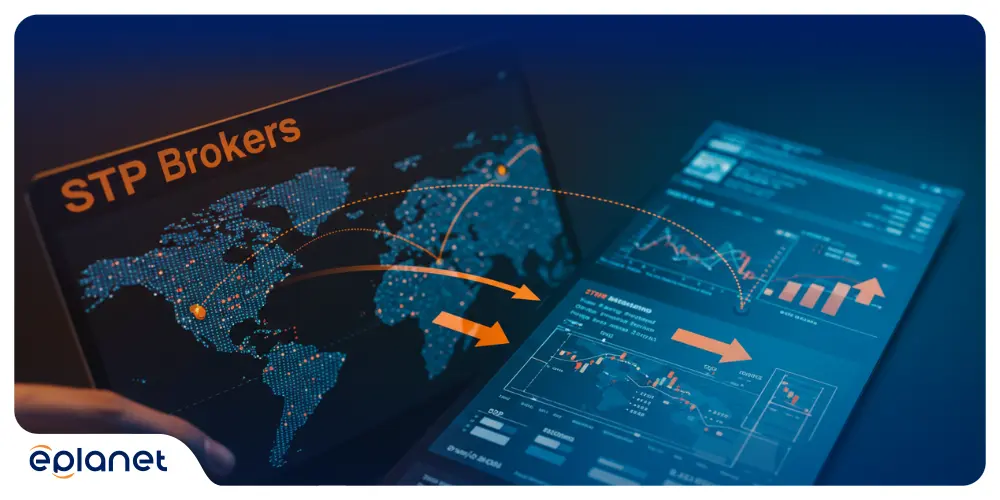
Choosing the right forex broker is like picking a business partner – you want someone reliable, transparent, and aligned with your goals. The forex market offers three main types of forex brokers: Market Makers, STP, and ECN brokers, each with distinct advantages and potential drawbacks. Understanding these differences isn’t just trading 101; it’s your roadmap to profitable partnerships and avoiding costly mistakes in the $7.5 trillion daily forex market.
Key Takeaways
Before we dive deep into the broker universe, here are the essential points that’ll save you time and potentially thousands of dollars:
- Market Makers create their own prices and profit from spreads – they’re your counterpart in trades.
- STP brokers pass your orders to liquidity providers without dealing desk intervention, offering more transparency.
- ECN brokers provide direct market access with the tightest spreads but charge commissions.
- Your trading style determines which broker type suits you best – scalpers need ECN, beginners might prefer Market Makers.
- Regulation and transparency matter more than flashy marketing promises and unrealistic spreads.
Introduction
Picture this: You’re standing at the entrance of the world’s largest financial marketplace, credit card in hand, ready to dive into forex trading. But here’s the thing – you can’t just waltz in alone. You need a broker, your gateway to this massive financial ecosystem.
But not all brokers are created equal. The three main types of forex brokers each serve different trading needs:
- Market Makers (Dealing Desk) – Act as your counterpart in trades, offering fixed spreads and instant execution.
- STP (Straight Through Processing) – Connect you directly to liquidity providers without dealing desk intervention.
- ECN (Electronic Communication Network) – Provide direct market access with the tightest spreads and full transparency.
It’s like choosing between a boutique hotel, a chain hotel, or an Airbnb – each offers a different experience, and your choice can make or break your trading journey.
I’ve seen traders make fortunes with the right broker and lose their shirts with the wrong one. The difference often comes down to understanding what type of broker you’re dealing with and whether their business model aligns with your trading strategy.
Market Makers (Dealing Desk): The Classic Choice
What Are Market Makers?
Market makers are the traditional powerhouses of retail forex trading. Think of them as the middleman who’s always ready to buy what you’re selling and sell what you’re buying. They create their own bid and ask prices, essentially becoming your trading counterpart.
Here’s where it gets interesting – and slightly controversial. When you buy EUR/USD through a market maker, you’re not actually buying it from another trader or the interbank market. You’re buying it from the broker themselves. It’s like going to a currency exchange booth at the airport; they set the rates, and you either take it or leave it.

How Market Makers Operate
Market makers maintain an internal order book and match client orders whenever possible. When they can’t match orders internally, they hedge their exposure in the interbank market. This model allows them to offer fixed spreads and instant execution – two features that many retail traders find appealing.
But here’s the plot twist: market makers profit when you lose. Since they’re often on the opposite side of your trades, there’s an inherent conflict of interest. This doesn’t necessarily mean they’re rigging the game against you, but it does mean their interests aren’t always perfectly aligned with yours.
Advantages of Market Makers
Fixed Spreads: You always know what you’re paying. Whether the market is calm or chaotic, your EUR/USD spread might stay at a consistent 2 pips.
Instant Execution: No waiting around. Your orders get filled immediately at the quoted price.
No Commission: The spread is typically your only cost.
Beginner-Friendly: Simple pricing structure and often robust educational resources.
Disadvantages of Market Makers
Potential Conflicts of Interest: Your broker profits when you lose, which can create perverse incentives.
Wider Spreads: Those fixed spreads are often wider than what you’d find in the interbank market.
Re-quotes: During volatile periods, you might experience re-quotes or execution delays.
Less Transparency: You’re not seeing real market prices.
STP (Straight Through Processing): The Middle Ground
Understanding STP Brokers
STP brokers represent the evolution of forex brokerage. They act as intermediaries, passing your orders directly to their liquidity providers without a dealing desk intervention. It’s like having a personal shopper who goes to multiple stores to find you the best deal, then passes that deal directly to you.
The beauty of STP lies in its simplicity and relative transparency. Your broker isn’t taking the opposite side of your trade; they’re simply facilitating the connection between you and the actual market participants.

The STP Advantage
No Dealing Desk: Your orders go straight to liquidity providers, reducing potential conflicts of interest.
Variable Spreads: You often get tighter spreads that reflect actual market conditions.
Market Execution: Your orders are executed at prevailing market prices.
Scalping-Friendly: Most STP brokers allow scalping and automated trading strategies.
STP Limitations
Spread Fluctuations: Variable spreads can widen dramatically during news events or low liquidity periods.
Slippage: You might not always get the exact price you see on your screen.
Markup on Spreads: While transparent, STP brokers often add a small markup to the raw spreads they receive.
ECN (Electronic Communication Network): The Professional’s Choice
What Makes ECN Special?
ECN brokers offer the closest thing to true market access for retail traders. They provide a platform where multiple market participants – banks, financial institutions, and individual traders – can trade directly with each other. Think of it as eBay for currency trading, where buyers and sellers interact directly.
When you place an order through an ECN broker, it goes into a pool with orders from other traders and institutions. The best bid and ask prices are displayed, and trades are executed based on price-time priority.

The ECN Experience
With ECN brokers, you’re seeing the real market depth. You can actually see how many lots are available at each price level, giving you insights that other broker types simply can’t provide. It’s like having VIP access to the trading floor.
ECN Advantages
Tightest Spreads: Raw spreads from the interbank market, often starting from 0 pips.
True Market Depth: See actual buy and sell orders in the market.
No Conflicts of Interest: Your broker makes money from commissions, not from your losses.
Anonymous Trading: Your orders are anonymous, preventing market manipulation.
24/5 Trading: Access to global liquidity around the clock.
ECN Drawbacks
Commission Costs: You’ll pay a commission on each trade, typically $3-7 per lot.
Variable Spreads: Spreads can spike during news events or illiquid periods.
Complexity: More sophisticated platform requirements and potentially steeper learning curve.
Higher Minimum Deposits: Often require larger initial investments.
Key Differences: A Side-by-Side Comparison
| Feature | Market Maker | STP | ECN |
|---|---|---|---|
| Spread Type | Fixed | Variable | Variable (Raw) |
| Commission | No | Usually No | Yes |
| Order Execution | Instant | Market | Market |
| Market Depth | No | Limited | Full |
| Conflict of Interest | Potential | Minimal | None |
| Minimum Deposit | Low | Medium | High |
| Best For | Beginners | Intermediate | Advanced |
| Scalping Allowed | Often Restricted | Yes | Yes |
Which Type of Forex Broker is Best?
Here’s the million-dollar question, and like most things in trading, the answer is: “It depends.”
For Beginners: Market Makers Might Be Your Friend
If you’re just starting out, market makers offer simplicity and predictability. Fixed spreads mean you can calculate your costs easily, and instant execution reduces the complexity of order management. Plus, many market makers invest heavily in educational resources and customer support.
For traders with accounts under $1,000 and less than six months of experience, Market Makers often provide the gentlest introduction to forex trading:
- Predictable costs help with risk management learning
- No commission complexity simplifies profit/loss calculations
- Wider spreads actually force better entry/exit discipline
- Guaranteed fills prevent the frustration of rejected orders
I’ve seen too many beginners jump straight to ECN brokers only to get overwhelmed by commission calculations and variable spreads during their learning phase.
For Active Traders: STP Offers Balance
STP brokers provide a sweet spot between simplicity and transparency. You get better spreads than market makers without the commission costs of ECN brokers. If you’re trading standard lot sizes and don’t need to see market depth, STP might be your goldilocks solution.
Once you’ve got 6-12 months under your belt and your account grows past $2,000, STP brokers offer the perfect stepping stone:
- Conflict-free environment without overwhelming complexity
- Market price exposure prepares you for professional trading
- Flexible account sizes accommodate your growing capital
- Strategy development benefits from honest price feeds
For Professional Traders: ECN is King
Serious traders who prioritize transparency, tight spreads, and direct market access usually gravitate toward ECN brokers. Yes, you’ll pay commissions, but the raw spreads often more than compensate for these costs, especially if you’re trading larger volumes.
ECN brokers become optimal when you meet these criteria:
- Trading volume exceeds 25 standard lots monthly
- Account balance surpasses $5,000
- You understand commission impact on strategy profitability
- Advanced order types enhance your trading methodology
The Hybrid Approach: Modern Reality
Here’s what I actually recommend to most traders: Start with a broker offering multiple execution models. This allows natural progression without the hassle of changing brokers as you evolve.
Many top-tier brokers now offer:
- Market Maker accounts for beginners
- STP execution for intermediate traders
- ECN access for professional volumes
- Seamless upgrades between account types
Understanding the Risks: What Could Go Wrong?
What are the Risks of ECN?
While ECN brokers offer transparency and tight spreads, they’re not without risks:
Spread Volatility: During major news events, spreads can widen dramatically. I’ve seen EUR/USD spreads balloon from 0.1 pips to 20+ pips during NFP releases.
Liquidity Gaps: In extremely volatile markets, there might be gaps in available liquidity, leading to slippage.
Technical Complexity: ECN platforms can be overwhelming for new traders, potentially leading to costly mistakes.
Commission Erosion: For small account holders, commissions can quickly eat into profits.
General Broker Risks
Regulatory Issues: Always ensure your broker is properly regulated. An unregulated broker might offer attractive terms but provide no protection for your funds.
Platform Failures: Technical issues can prevent you from closing positions during critical market movements.
Withdrawal Problems: Some brokers make it easy to deposit but difficult to withdraw funds.

The Difference Between ECN and STP Forex Brokers
While both ECN and STP brokers offer more transparency than market makers, there are crucial distinctions:
Execution Model
STP brokers route your orders to their liquidity providers but don’t provide market depth visibility. ECN brokers show you the actual order book with all available bid and ask prices.
Pricing Structure
STP brokers typically add a markup to the spreads they receive from liquidity providers. ECN brokers pass through raw spreads but charge separate commissions.
Market Access
STP gives you indirect market access through liquidity providers. ECN provides direct access to the interbank market and other ECN participants.
Anonymity
With STP, your liquidity provider knows the order came from a specific broker. ECN orders are completely anonymous.
Which is Better: STP or ECN?
The STP vs. ECN debate is like comparing a luxury sedan to a sports car – both are excellent, but for different purposes.
Choose STP if:
- You want transparency without commission costs
- You trade standard lot sizes
- You don’t need to see market depth
- You prefer simpler fee structures
Choose ECN if:
- You prioritize absolute transparency
- You trade large volumes where commission costs are negligible relative to spread savings
- You want to see real market depth
- You’re comfortable with more complex pricing structures
Red Flags: What to Avoid
Too-Good-to-Be-True Spreads
If a broker advertises 0-pip spreads on major pairs without mentioning commissions, dig deeper. They’re either markup spreads elsewhere or aren’t being transparent about their fee structure.
Unregulated Brokers
No matter how attractive the terms, avoid unregulated brokers. Your funds have no protection if things go wrong.
Pressure Sales Tactics
Legitimate brokers don’t pressure you into larger deposits or risky trading strategies. If someone’s pushing you to deposit more money or trade specific instruments, run.
Withdrawal Restrictions
Be wary of brokers with complicated withdrawal procedures or unreasonable withdrawal fees.

Making Your Choice: A Practical Approach
Step 1: Assess Your Trading Style
Are you a day trader, swing trader, or long-term position trader? Scalpers need ECN, while position traders can work well with any broker type.
Step 2: Consider Your Experience Level
New traders benefit from the simplicity of market makers, while experienced traders often prefer the transparency of ECN.
Step 3: Evaluate Your Capital
ECN brokers often require larger minimum deposits and are more cost-effective for larger trading volumes.
Step 4: Research Regulation
Ensure your chosen broker is regulated by reputable authorities like the CFTC, FCA, or ASIC.
Step 5: Test the Platform
Use demo accounts to test different broker types and see which feels most comfortable.
Advanced Broker Considerations
Regulation: Your Safety Net
Never—and I mean never—trade with an unregulated broker, regardless of their execution model. Here’s why regulation matters more than spreads:
US Regulatory Bodies:
- CFTC (Commodity Futures Trading Commission)
- NFA (National Futures Association)
- FINRA (for some forex offerings)
International:
- FCA (UK) – Gold standard for forex regulation
- ASIC (Australia) – Strong consumer protection
- CySEC (Cyprus) – EU passporting rights
- FSCA (South Africa) – Emerging market oversight
The Securities Investor Protection Corporation (SIPC) may protect you if a brokerage firm goes bankrupt or if your securities are stolen. You should check whether your brokerage firm has this important coverage. SIPC does not protect you against declines in your investment holdings.
Technology Infrastructure
Modern forex trading demands robust technology. Evaluate brokers on:
Platform Stability:
- Uptime statistics during volatile market periods
- Mobile platform functionality
- Order execution speed benchmarks
- Historical performance during major news events
Advanced Features:
- Algorithmic trading support (API access)
- Advanced charting packages
- Risk management tools
- Social trading integration options
Customer Service Quality
When your trade goes wrong at 3 AM EST (during Sydney session), you need responsive support:
Service Evaluation Criteria:
- 24/5 availability during market hours
- Multiple communication channels (chat, phone, email)
- Response time benchmarks
- Technical knowledge depth
- Multi-language support capabilities
Hidden Costs Analysis
Beyond spreads and commissions, watch for:
Funding/Withdrawal Fees:
- Bank wire charges ($15-50 per transaction)
- Credit card processing fees (2-3%)
- E-wallet service charges
- Currency conversion markups
Inactivity Penalties:
- Account maintenance fees during dormancy
- Platform usage charges
- Data feed subscriptions
- Minimum activity requirements

The Future of Forex Brokerage
The brokerage industry continues evolving, with many firms offering hybrid models that combine features from different broker types. Some market makers now offer ECN accounts for larger traders, while traditional ECN brokers are simplifying their fee structures to attract retail traders.
Artificial intelligence and machine learning are also reshaping how brokers operate, potentially reducing conflicts of interest and improving execution quality across all broker types.
Frequently Asked Questions
What are the different types of forex brokers?
The three main types of forex brokers are Market Makers (Dealing Desk), STP (Straight Through Processing), and ECN (Electronic Communication Network) brokers. Each offers different execution models, pricing structures, and levels of market access.
Which type of forex broker is best for beginners?
Market Makers are often best for beginners due to their fixed spreads, instant execution, and educational resources. They offer predictable costs and simpler fee structures that are easier to understand when starting out.
What’s the difference between ECN and STP forex brokers?
ECN brokers provide direct market access with full order book visibility and charge commissions on raw spreads. STP brokers route orders to liquidity providers with markup on spreads but typically don’t charge separate commissions.
Are ECN brokers always better than Market Makers?
Not necessarily. ECN brokers offer more transparency and potentially lower costs for high-volume traders, but Market Makers can be better for beginners or traders who prefer fixed spreads and simpler pricing structures.
What are the risks of using different broker types?
Market Makers pose potential conflicts of interest since they profit from client losses. STP brokers may have spread markup issues, while ECN brokers can experience extreme spread volatility during news events and charge additional commissions.
Conclusion: Your Trading Partnership Matters
Choosing the right type of forex broker isn’t just a technical decision – it’s about finding a partner who aligns with your trading goals, experience level, and risk tolerance. Market makers offer simplicity, STP brokers provide balance, and ECN brokers deliver transparency.
The best broker type for you depends on your individual circumstances. A beginner might thrive with a market maker’s fixed spreads and educational resources, while a professional scalper needs ECN’s raw spreads and market depth.
Remember, the most important factors aren’t just the broker type, but the broker’s regulation, reputation, and reliability. Do your homework, test different platforms, and don’t rush the decision. Your choice of broker can significantly impact your trading success.
Ready to start your broker search? Begin with regulated brokers in your jurisdiction, compare their offerings across different account types, and always test their platforms with demo accounts before committing real money. Your future trading success might just depend on this crucial first step.

